Filter by

The Joseph Story between Egypt and Israel
Within the context of the Torah, the Joseph story can be read as a transition that explains why Jacob and his family came to Egypt. However, if one looks at other texts of the Hebrew Bible, there is no mention of the Joseph story; instead, the arrival of the Israelites is said to be the result of the decision of a "father" or of "fathers" to go down do Egypt. Indeed, there are very few referenc…
- Edition
- -
- ISBN/ISSN
- 9783161601545
- Collation
- -
- Series Title
- -
- Call Number
- -

The Interpretation of Freedom in the Letters of Paul
Wayne Coppins investigates the interpretation of freedom in Paul's letters with special reference to Martin Luther and twentieth-century "German" New Testament scholarship. He focuses on three key issues, namely the importance of freedom in Paul's letters and theology, the centrality and meaning of "freedom from the law," and the relationship between freedom and service. In addition to providin…
- Edition
- -
- ISBN/ISSN
- 9783161516047
- Collation
- -
- Series Title
- -
- Call Number
- -
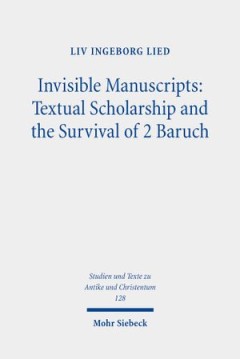
Invisible Manuscripts Textual Scholarship and the Survival of 2 Baruch
In this critical exploration of the role of manuscripts in textual scholarship, Liv Ingeborg Lied studies the Syriac manuscript transmission of 2 Baruch. These manuscripts emerge as salient sources to the long life of 2 Baruch among Syriac speaking Christians, not merely witnesses to an early Jewish text. Inspired by the perspective of New Philology, Lied addresses manuscript materiality and pa…
- Edition
- -
- ISBN/ISSN
- 9783161606731
- Collation
- -
- Series Title
- -
- Call Number
- -
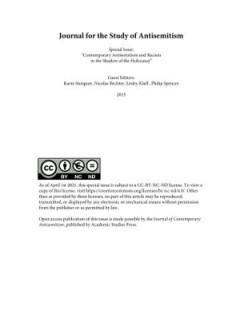
Journal for the Study of Antisemitism Contemporary Antisemitism and Racism i…
This Special Issue of the Journal for the Study of Antisemitism contains a collection of papers that were presented at the International Conference “Contemporary Antisemitism and Racism in the Shadow of the Holocaust”—the midterm conference of the Research Network on Ethnic Relations, Racism and Antisemitism within the European Sociological Association. The network was set up over a decad…
- Edition
- -
- ISBN/ISSN
- 9780000000725
- Collation
- -
- Series Title
- -
- Call Number
- -

Italian Jewry in the Early Modern Era Essays in Intellectual History
Between the years 1550 and 1650, Italy's Jewish intellectuals created a unique and enduring synthesis of the great literary and philosophical heritage of the Andalusian Jews and the Renaissance`s renewal of perspective. While remaining faithful to the beliefs, behaviors, and language of their tradition, Italian Jews proved themselves open to a rapidly evolving world of great richness. The crisi…
- Edition
- -
- ISBN/ISSN
- 9781618112088
- Collation
- -
- Series Title
- -
- Call Number
- -
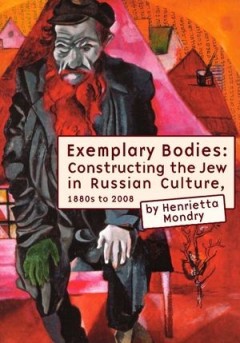
Exemplary Bodies Constructing the Jew in Russian Culture, 1880s to 2008
Exemplary Bodies: Constructing the Jew in Russian Culture, 1880s to 2008 explores the construction of the Jew’s physical and ontological body in Russian culture as represented in literature, film, and non-literary texts from the 1880s to the present. With the rise of the dominance of biological and racialist discourse in the 1880s, the depiction of Jewish characters in Russian literary and cu…
- Edition
- -
- ISBN/ISSN
- 9781934843390
- Collation
- -
- Series Title
- -
- Call Number
- -
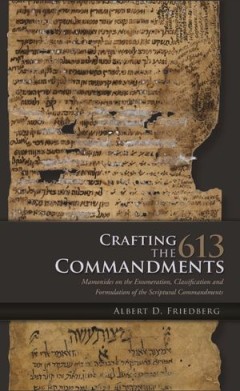
Crafting the 613 Commandments Maimonides on the Enumeration, Classification,…
Rabbinic tradition has it that 613 commandments were given to Moses on Mount Sinai, but it does not specify those included in the enumeration. Maimonides methodically and artfully crafts a list of 613 commandments in a work that serves as a prolegemenon to the Mishneh Torah, his monumental code of law. This book explores the surprising way Maimonides put this tradition to use and his possible r…
- Edition
- -
- ISBN/ISSN
- 9781618111678
- Collation
- -
- Series Title
- -
- Call Number
- -
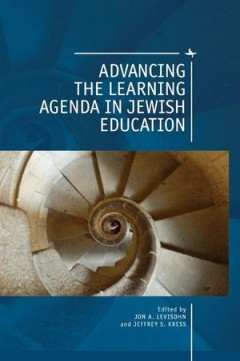
Advancing the Learning Agenda in Jewish Education BOOK 2018 Advancing the …
Jewish educational projects and programs are thriving, attracting philanthropic support for exciting and creative approaches in every sector and setting. But underneath that energy, we are not as clear as we ought to be about desired outcomes, the kinds of learning needed to achieve these, and how those kinds of learning actually occur. This volume is the first of its kind to bring together sch…
- Edition
- -
- ISBN/ISSN
- 9781644692837
- Collation
- -
- Series Title
- -
- Call Number
- -
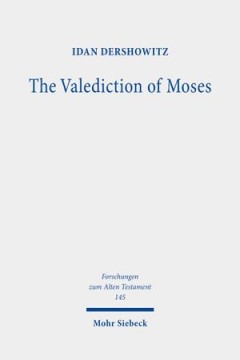
The Valediction of Moses A Proto-Biblical Book
Moses Wilhelm Shapira's infamous Deuteronomy fragments - long believed to be forgeries - are authentic ancient manuscripts, and they are of far greater significance than ever imagined. The literary work that these manuscripts preserve - which Idan Dershowitz calls "The Valediction of Moses" or "V" - is not based on the book of Deuteronomy. On the contrary, V is a much earlier version of Deutero…
- Edition
- -
- ISBN/ISSN
- 9783161606458
- Collation
- -
- Series Title
- -
- Call Number
- -
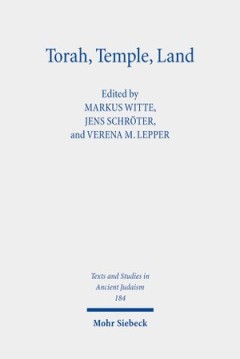
Torah, Temple, Land Constructions of Judaism in Antiquity
The present volume contains the proceedings of a conference held in October 2018 at Humboldt University Berlin. The articles reflect the different categories of describing Judaism of the Second Temple Period in view of their sustainability in characterising an ancient religious community in different historical situations and discuss relevant (re)constructions of ancient Judaism in the history …
- Edition
- -
- ISBN/ISSN
- 9783161598548
- Collation
- -
- Series Title
- -
- Call Number
- -
 Computer Science, Information & General Works
Computer Science, Information & General Works  Philosophy & Psychology
Philosophy & Psychology  Religion
Religion  Social Sciences
Social Sciences  Language
Language  Pure Science
Pure Science  Applied Sciences
Applied Sciences  Art & Recreation
Art & Recreation  Literature
Literature  History & Geography
History & Geography